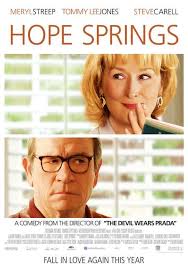
HOPE SPRINGS
US, 2012, 100 minutes, Colour.
Meryl Streep, Tommy Lee Jones, Steve Carell, Jean Smart, Elisabeth Shue, Mimi Rogers.
Directed by David Frankel.
Talent, age, experience. All very impressively present in this light and serious comedy about marriage and marriage counseling.
Both Meryl Streep and Tommy Lee Jones, in their 60s, are so at home in front of the camera that their performances seem effortless – but, it is obvious that they have given a great deal of thought to each scene, even to body language with small details.
Hope springs eternal, of course. The title refers to Great |Hope Springs, a small town in Maine.
In the meantime, in Omaha, Kay and Arthur are a 31 years married couple with two children. Their lives roll out every day in the same, the very same way. They love each other but have separate rooms. Is that all there is? Kay doesn’t think so and really can’t understand Arthur’s unwillingness to touch, his rather going to work, coming home to his meal and falling asleep before golf programs on TV. She looks for some books to help and discovers Dr (Steve Carell whose performance, except for the final credits, consists of sitting, listening empathetically and suggesting action steps). She watches his on-line promotion and books tickets to his office in Maine.
Most of the film is how Kay and Arthur deal with the sessions – he, of course, off side right from the start. Kay discovers that she is very traditional, even narrowly unaware, in her understanding of marriage and sex. The film also shows the ups and downs of the relationship after each session, the tension in finding a way to touch each other, let alone some relational behaviour that they are not used to (especially a farcical scene in a cinema). The two stars are at their best and their comic timing is impeccable. Tommy Lee Jones is amazingly good in making Arthur, his lack of awareness of how his wife feels, completely credible.
The screenplay makes the two a couple who are decent and good people who need the counseling to rediscover their love – especially going back to their meeting, their falling in love and the possibilities that were there as they married.
Afterwards? Back to ‘normal’? A fresh beginning? Of course. But the interest and the delight is in watching how it all work out. And the makers are shrewd. They keep plot development going all the way through the credits, keeping us there, a very happy family celebration and love renewal.
The film is strongly in favour of love, of fidelity, of marriage commitment, of not opting out of getting help but actively seeking it. Just as Kay tried to persuade Arthur to go to see Dr for couple counseling, many women may well be insisting that their husbands come with them to see Hope Springs. Yes.
1. The title, hope springs eternal, the place, a place of hope, fulfilment?
2. The Midwest, life in Omaha, homes, offices, ordinary life, shops? The contrast with Maine, the historic town, quaint, streets, restaurants, buildings, hotels? The contrast? The musical score?
3. The strong cast – age, experience, talent?
4. Kay’s story, her age, married thirty-one years, her room, looking at Arnold, his ignoring her? The effect of being alone, loneliness, the prospects for the future? Cooking the breakfast, Arnold reading the paper, eating, the routine? His return, the mail, golf, watching it on TV, Kay waking him up, the remote, lights out, his room?
5. Arnold unaware, the years passing, his room, reading, not touching Kay, uncomprehending? Dinner, the TV programs? At work? His diligence?
6. Kay, the television, the book, going online, getting the tickets, telling Arnold, his refusal, his talking with his boss, his boss’s failed marriage, Kay and the taxi to the airport, Arnold waking up, going onto the plane? Kay’s happiness?
7. The drive through Maine, the economotel? Settling in? The breakfast, the waitress knowing all about Doctor Feld’s clients? Ten-thirty appointment?
8. Doctor Feld, Steve Carell and his playing the character straight, listening, advice, his personality, his office, method, talking, listening, asking questions, suggestions, reviewing the behaviour?
9. Kay and her talk, her honesty, her dismay at Arnold, surprise about sexuality and behaviour, her feelings, the issue of touching, her disappointment with Arnold’s reaction, Arnold and his hostility, cracks, wanting to get out? Their being asked what each other hoped for?
10. The experiment with touch, the awkwardness, making the report? The steps, sex? Kay and her being uncomfortable? The cinema sequence and the farce? The book on gay tips, bananas? The details? The raising of the issue of the threesome? Kay and Arnold and their decency, ordinary?
11. The clash, Kay wandering around, Arnold at the motel, the tensions?
12. Arnold, the pressure, going to the restaurant, forcing the owner to have a table, the table itself, the meal, Kay’s delight, rekindling the memories, going to the room, the failure in the encounter, disappointment?
13. Going home, back to the same routines? Arnold and his return home? The touch, the love between the two, enkindled again, the effect?
14. The final credits, renewal of vows on the beach, the family all being present, the doctor? The beach joy?
15. The light touches, the cameo roles, Elisabeth Shue and her advice in the bar, the joke about Carol the neighbour and the threesome? Eileen, Kay’s friend at work and their discussions?
16. The blend of the light and serious? The effect of watching the film – and older couples being encouraged to reflect – and even seek counselling?